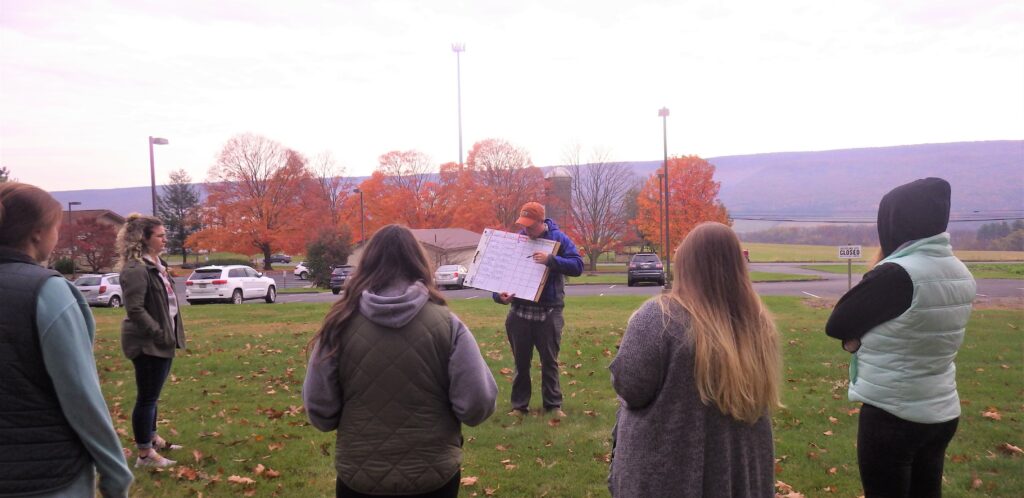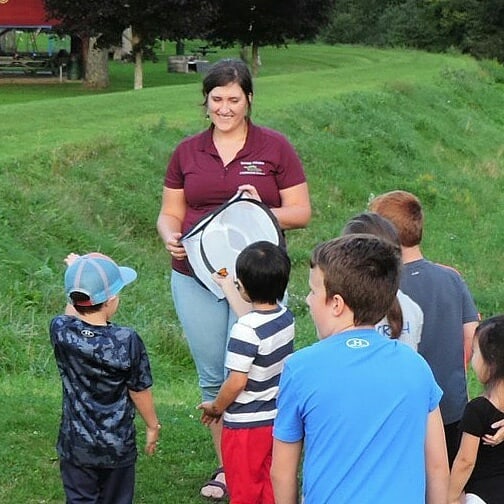Environmental education programs inspire stewardship in the PA Wilds
By Karen Elias
As our planet continues to heat due to climate change, we are becoming more aware of water as both a precious life-sustaining resource and a potential challenge. Here in Pennsylvania, several counties were recently experiencing severe drought. But as temperatures continue to rise across the Commonwealth, every county is expected to become warmer and wetter, factors that — according to a recent report from the PA Department of Environmental Protection (DEP) — will create potential problems. Increased rainfall brings greater chances of flooding and forces pollution runoff into our streams and rivers. It also disrupts planting schedules and puts added stress on our energy, transportation and water infrastructures, many of which are located in areas susceptible to flooding and landslides.
The DEP is hoping to head off these problems before they become emergencies by creating “environmental stewards among Pennsylvanians of all ages and backgrounds,” according to DEP Secretary Patrick McDonnell. The first step in creating resilience is greater awareness, and to this end the DEP is encouraging efforts to develop new, or expand current, environmental programming through its Environmental Education Grants Program.
The program was established by the Environmental Education Act of 1993, which mandates that 5% of the pollution penalties that DEP collects every year be set aside for promotion of environmental education in Pennsylvania. To date, the DEP has awarded $12 million in grants to support these efforts throughout the state. The funds are used to support projects that include creative, hands-on lessons for students, materials for teacher training programs, and resources for outdoor learning.
This year the DEP awarded $434,168 in grant money to 55 innovative environmental education projects. Among those receiving awards were two counties, Potter and Clinton, in the PA Wilds.
The Clinton County Conservation District (CCCD) received its award for one of the many educational programs they sponsor each year. Toby Boyer, the Watershed Specialist and Education Coordinator for the CCCD who wrote the winning grant, described the project.
“We usually work with Lock Haven University,” he said, “to give their pre-service teachers a chance to obtain Project WET certification two times per year. Project WET is a curriculum that teaches science and water education. This curriculum includes all types of information regarding how we use water, drinking water, water ecology, the chemical makeup of water, and much more. It’s an excellent all-around tool for a student who’s on track to become an educator.”

The CCCD offers these pre-service trainings in the WET curriculum twice a year, during the fall and spring semesters, typically using a hands-on format that allows prospective teachers to practice ways of incorporating lessons on water into their classes at various skill levels and for a variety of subject disciplines. The training will take place this semester as a Zoom conference due to COVID-19 restrictions. This year’s grant money will be used to defray the costs of the WET resource manuals, as well as purchase materials like knee boots and water quality test kits to help the CCCD provide better hands-on education to students in the county.
An Environmental Education Grant was also awarded to the Potter County Conservation District in support of several free workshops held this fall to educate the public about a variety of environmental issues. Each workshop was held outdoors at Mitchell Park in Coudersport; masks and social distancing requirements were followed, and the workshops used a combination of lecture and hands-on activities to stimulate learning.
The funding supported workshops on pollinator health, water conservation, and tree planting, and each event allowed participants to complete a hands-on project to take home. At one, they constructed solitary bee nesting boxes; at another, they made rain barrels; and at a third, they were each given between 10 and 15 Norway Spruce trees to plant. Each workshop touched on water issues, including conservation, pollution prevention, availability, and stormwater management. At the tree planting workshop, participants learned about the value of planting trees in riparian areas — the zones between land and rivers or streams — to slow the flow of surface water so that it can more easily be absorbed, and to filter sediment to prevent it from being carried off downstream, thereby preserving water quality.
Emily Shosh, Communications and Outreach Advisor for the Potter County Conservation District and writer of the winning grant, said of Potter County’s programs, “Our programs are all aimed to provide simple backyard conservation tools with the goal of increasing environmental self-efficacy (motivation and confidence in one’s self to make positive changes for the environment) of the public we serve.”
(At right, Emily Shosh is pictured during an environmental education program on monarch butterflies.)

These projects attest to the dedication of Pennsylvania’s environmental educators who are developing innovative ways to help us care more thoughtfully for the world around us.
“Through the DEP Environmental Education Grants,” according to Governor Wolf, “Pennsylvanians of all ages gain knowledge of the natural world, appreciation for the importance of a healthy environment, and an understanding of the need for environmental protection and sound resource management.”
The 2021 Environmental Education Grants program application period opened on September 11, 2020. Groups eligible to apply for funding include school districts, private schools, colleges and universities, intermediate units, environmental education centers, nonprofit conservation and education organizations, and business and county conservation districts. The deadline is December 11, 2020. You are encouraged to apply. Refer to the DEP website for further information.
About the Author
Karen Elias, retired after 40 years of teaching college English, is now working as a freelance writer and environmental advocate in Lock Haven. She recently completed training to become a Climate Reality leader and is using her writing to increase both awareness of our precious natural resources and support for environmental sustainability. As a regular contributor who shares Stories of Personal Experience And Knowledge to the PA Wilds Are Calling blog, Karen is a member of WildSPEAK, the PA Wilds Civilian Storyteller Corps.



